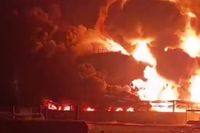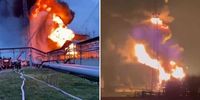On the night of March 22, 2025, an alarming incident unfolded at an oil depot in the Caucasus region of the Krasnodar Territory in Russia, where a significant release of petroleum products occurred. The situation arose when a fire ignited within one of the storage tanks, leading to a substantial amount of flammable material spilling beyond its confines. Fortunately, no injuries were reported amidst the chaos.
Reports from the regional operational headquarters indicated that part of the spilled petroleum products had already been successfully extinguished. However, the fire continued to blaze, spreading to a second tank and thus covering an area that measured around 2,000 square meters. Despite the raging inferno, authorities confirmed that firefighters had managed to confine the flames within the restricted perimeter of the second tank.
The escalation of this emergency required a significant response from the Ministry of Emergency Situations, deploying teams from adjacent regions including Adygea, the Rostov Region, and Stavropol Krai. In total, approximately 473 personnel and 189 units of fire-fighting equipment mobilized to contain the situation. The firefighting efforts also involved specialized equipment, such as four fire trains, which were brought in to transport water crucial for combating the flames.
As the situation developed, experts from the Ministry of Emergency Situations worked diligently to cool the tanks in close proximity to the fire. This precaution aimed to minimize the risk of further incidents while addressing the ongoing blaze. As reported, ongoing measures have been effective in keeping the fire largely contained.
In a broader context, this incident at the Krasnodar oil depot is tied to a prior drone attack that occurred on March 19, which initially triggered the fire outbreak. Following the drone strike, a pipeline between tanks was damaged, leading to subsequent leaks. On March 21, an explosion took place, causing further complications as the burning tank was damaged, resulting in injuries to two firefighters who suffered from smoke inhalation and burns.
The Russian Ministry of Defense noted that this particular facility plays a key role in the transfer of oil from railway tanks to the Caspian Pipeline Consortium's pipeline system. Thus, the safety measures and containment efforts have broader implications for regional energy supply and security.
By the evening of March 21, emergency responders had managed to fully extinguish the first ignited tank; however, as new issues arose, the area of the fire swelled to 10,000 square meters earlier that day before authorities successfully brought it back down to 2,000 square meters.
In light of these developments, the Krasnodar regional authority continues to monitor the situation closely, providing updates as the firefighting operations carry on. The operational headquarters of Kuban has indicated that firefighters will remain on the scene until the risk of fire recurrence is fully mitigated.
Despite the significant challenges posed by this incident, skilled teams are, as per ongoing assessments, managing to navigate the complexities of the firefighting efforts. Their dedication to preserving both personnel safety and the stability of the local environment remains critical as they confront this emerging crisis.
This incident serves as a reminder of the vulnerabilities inherent in infrastructure tied to energy production and transportation, especially under the threat of external attacks. As such, it underscores the continuing necessity for vigilance and robust emergency response capabilities in similar facilities across the nation.
In summary, while the situation at the Caucasian oil depot has shown signs of stabilization, ongoing efforts are crucial to ensure no further environmental contamination occurs and that safety remains paramount for all personnel involved in the operations.







